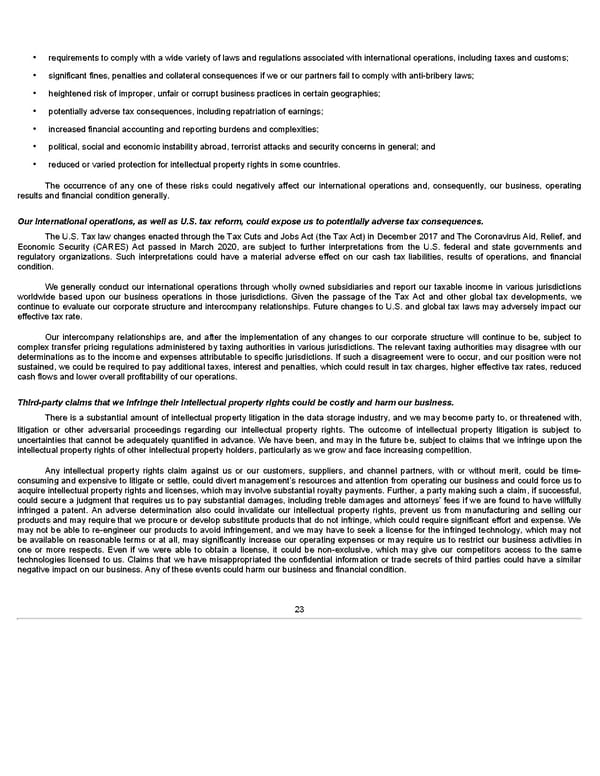• requirements to comply with a wide variety of laws and regulations associated with international operations, including taxes and customs; • significant fines, penalties and collateral consequences if we or our partners fail to comply with anti-bribery laws; • heightened risk of improper, unfair or corrupt business practices in certain geographies; • potentially adverse tax consequences, including repatriation of earnings; • increased financial accounting and reporting burdens and complexities; • political, social and economic instability abroad, terrorist attacks and security concerns in general; and • reduced or varied protection for intellectual property rights in some countries. The occurrence of any one of these risks could negatively affect our international operations and, consequently, our business, operating results and financial condition generally. Our international operations, as well as U.S. tax reform, could expose us to potentially adverse tax consequences. The U.S. Tax law changes enacted through the Tax Cuts and Jobs Act (the Tax Act) in December 2017 and The Coronavirus Aid, Relief, and Economic Security (CARES) Act passed in March 2020, are subject to further interpretations from the U.S. federal and state governments and regulatory organizations. Such interpretations could have a material adverse effect on our cash tax liabilities, results of operations, and financial condition. We generally conduct our international operations through wholly owned subsidiaries and report our taxable income in various jurisdictions worldwide based upon our business operations in those jurisdictions. Given the passage of the Tax Act and other global tax developments, we continue to evaluate our corporate structure and intercompany relationships. Future changes to U.S. and global tax laws may adversely impact our effective tax rate. Our intercompany relationships are, and after the implementation of any changes to our corporate structure will continue to be, subject to complex transfer pricing regulations administered by taxing authorities in various jurisdictions. The relevant taxing authorities may disagree with our determinations as to the income and expenses attributable to specific jurisdictions. If such a disagreement were to occur, and our position were not sustained, we could be required to pay additional taxes, interest and penalties, which could result in tax charges, higher effective tax rates, reduced cash flows and lower overall profitability of our operations. Third-party claims that we infringe their intellectual property rights could be costly and harm our business. There is a substantial amount of intellectual property litigation in the data storage industry, and we may become party to, or threatened with, litigation or other adversarial proceedings regarding our intellectual property rights. The outcome of intellectual property litigation is subject to uncertainties that cannot be adequately quantified in advance. We have been, and may in the future be, subject to claims that we infringe upon the intellectual property rights of other intellectual property holders, particularly as we grow and face increasing competition. Any intellectual property rights claim against us or our customers, suppliers, and channel partners, with or without merit, could be time- consuming and expensive to litigate or settle, could divert management’s resources and attention from operating our business and could force us to acquire intellectual property rights and licenses, which may involve substantial royalty payments. Further, a party making such a claim, if successful, could secure a judgment that requires us to pay substantial damages, including treble damages and attorneys’ fees if we are found to have willfully infringed a patent. An adverse determination also could invalidate our intellectual property rights, prevent us from manufacturing and selling our products and may require that we procure or develop substitute products that do not infringe, which could require significant effort and expense. We may not be able to re-engineer our products to avoid infringement, and we may have to seek a license for the infringed technology, which may not be available on reasonable terms or at all, may significantly increase our operating expenses or may require us to restrict our business activities in one or more respects. Even if we were able to obtain a license, it could be non-exclusive, which may give our competitors access to the same technologies licensed to us. Claims that we have misappropriated the confidential information or trade secrets of third parties could have a similar negative impact on our business. Any of these events could harm our business and financial condition. 23
 Annua lReport Page 22 Page 24
Annua lReport Page 22 Page 24